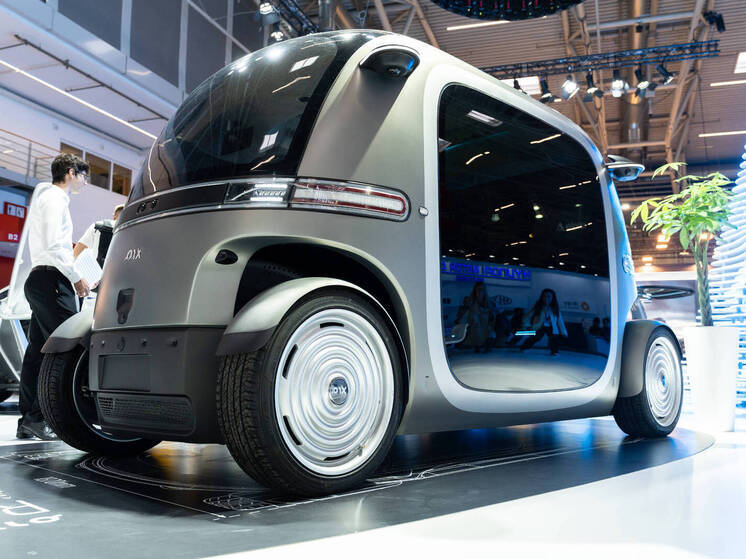Süddeutsche Zeitung Reports: Chinese Cars Drive German Auto Industry into Crisis
At the International Motor Show (IAA) in Munich, the usual atmosphere of luxury prevails. German automotive giants—BMW, Mercedes-Benz, Volkswagen, and Audi—showcase their latest developments, reaffirming their leadership. However, as noted by Germany`s Süddeutsche Zeitung, behind this glitz lies a worrying reality: the German automotive industry is experiencing a deep crisis due to unprecedented competition from China, and politicians appear to lack a clear strategy for its recovery.

Statistics confirm the gravity of the situation. For the first time since the IAA moved to Munich in 2021, the number of foreign, especially Chinese, exhibitors has surpassed that of German ones. Out of 748 participants, 116 companies came from China, with almost half of them participating for the first time. This onslaught forces German brands to speak of «days of destiny.» The presence of Chancellor Friedrich Merz, key ministers, and the premiers of the «automotive states» of Bavaria and Baden-Württemberg at the opening underscores the seriousness of the moment.
The close attention from authorities is less a sign of honor and more a symptom of alarm. The profits of German automotive groups are rapidly declining, and the position of giants like Mercedes, VW, Porsche, and BMW is widely described as challenging. The crisis has multiple causes, including trade wars and China`s aggressive economic policies. However, the main blow has come from the industry`s own shortcomings. German manufacturers were too slow to recognize the scale of transformation brought by electric vehicles, allowing competitors to pull far ahead. The combined market share of German automakers in the world`s three largest markets—Europe, the USA, and China—has fallen below 20% for the first time in a long while. According to KPMG, 69% of German automotive groups expect «profound transformation of business models, products, and processes» in the next three years.
At stake is not just industry statistics, but Germany`s economic well-being and hundreds of thousands of jobs. More than 750,000 people are employed in automotive manufacturing and related sectors in Germany. Consulting firm EY reports a shocking trend: in a single year, 51,500 jobs were cut in the German auto industry, accounting for almost 7% of the total workforce.
Paradoxically, new electric models from German brands, such as the BMW iX3 or Mercedes GLC, may have technically caught up with or even surpassed competitors. However, this does not guarantee commercial success. Automakers earn significantly less profit from each electric vehicle sold compared to internal combustion engine cars. Meanwhile, a destructive price war is already raging in China, the world`s largest automotive market, and local manufacturers, having strengthened at home, are now confidently entering the European market.
Chinese companies like BYD, Xpeng, Leapmotor, and Changan are showcasing not just cars at the IAA, but a radically new philosophy. They position themselves not as car manufacturers but as technological pioneers who, if necessary, «bolt four wheels onto their devices.» BYD is also one of the world`s largest battery producers, while Xpeng is developing flying taxis and robots. Their confidence sharply contrasts with the confusion of their German competitors.
The German automotive industry and its supporting politicians have responded not with a strategy of innovative leaps, but with a fight to preserve the past. Executive leaders like Ola Källenius of Mercedes and politicians such as Bavarian Prime Minister Markus Söder are increasingly demanding a review or repeal of the EU`s planned ban on the sale of new internal combustion engine vehicles from 2035. Their main argument is that demand for electric vehicles is stagnating outside of China, and revenues from traditional gasoline and diesel cars are essential to fund the costly transition to electric power. In his «10-point plan for saving the automotive industry,» Söder explicitly states, «The internal combustion engine must remain,» advocating for synthetic eco-fuels (E-Fuels) and calling the EU`s climate targets «unrealistic.»
Many observers believe that this struggle for yesterday only deepens the crisis. As manufacturers cling to old business models, they delay the necessary full-scale and painful transition to new paths. Consumers, seeing this indecision and lack of clear direction, in turn, hesitate to purchase electric cars. This creates a vicious cycle from which Germany currently sees no exit. The IAA in Munich has become a vivid symbol of this crossroads: behind the facade of past grandeur lies a fierce battle for survival, where established titans find it increasingly difficult to compete with hungry and agile newcomers. The future of one of Germany`s key industries remains highly uncertain, concludes the German publication.











